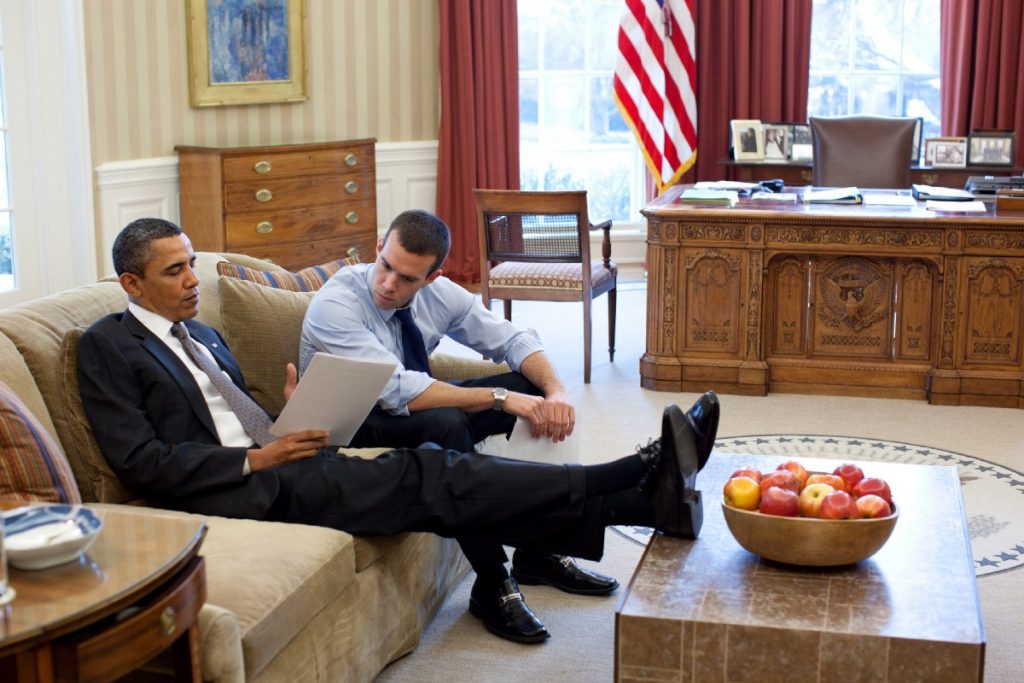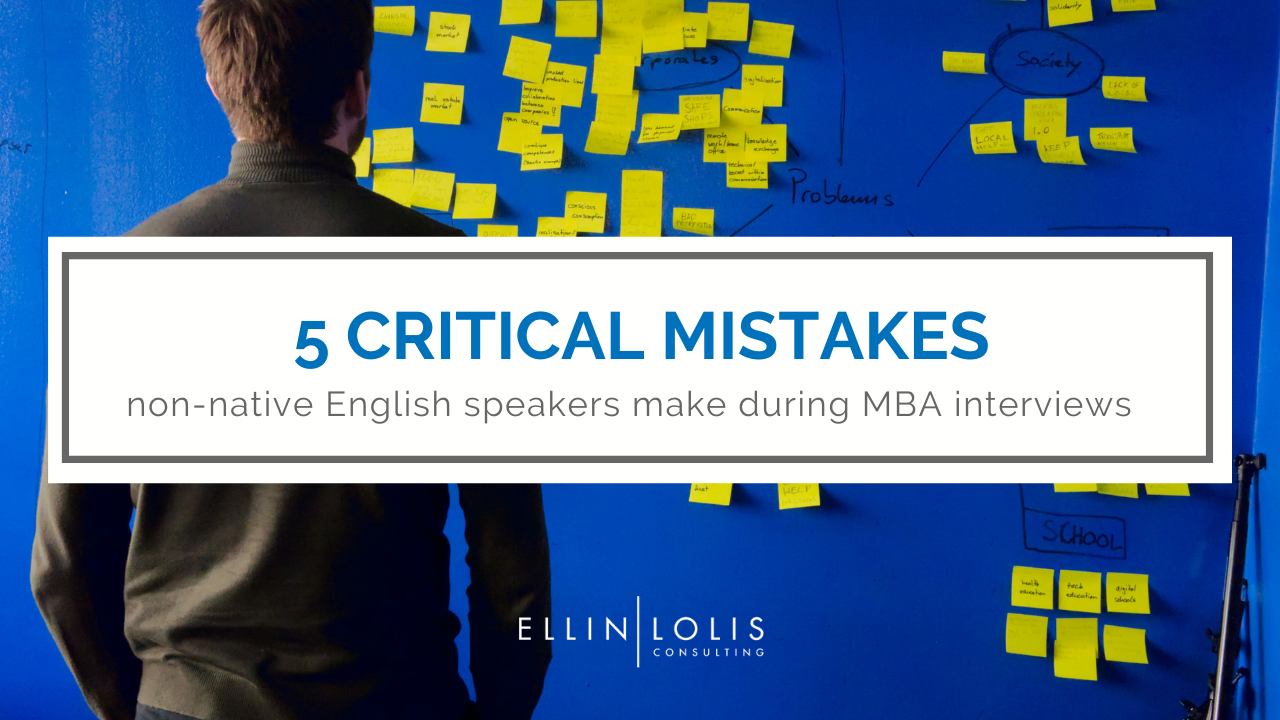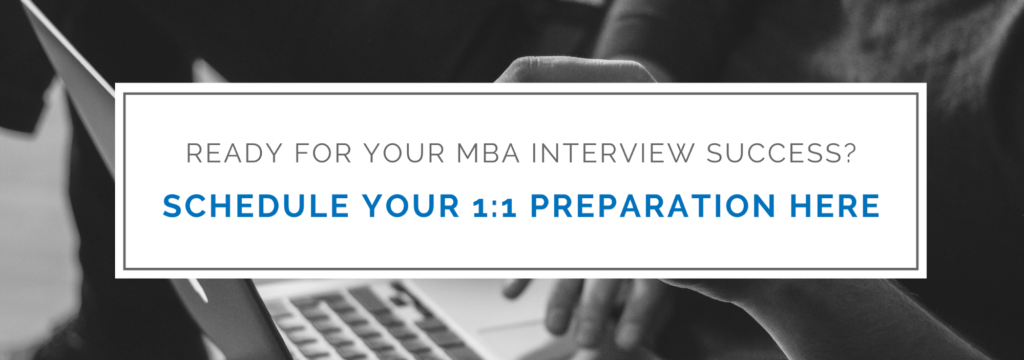UPDATE: This article was originally posted on October 8, 2018. It has been updated with new information and tips below.
After months (or years!) of preparation, you’ve finally received good news: you’ve been selected to interview at one or more of your top choice MBA programs!
Though this is certainly causing for celebration, it’s not time to break out the champagne quite yet. After all, only about 50% of candidates who interview at elite business schools actually get in. This means that MBA interviews require extensive preparation.
But what if you’re not a native English speaker?
Like it or not, non-native English speakers have a tougher time successfully navigating the MBA interview, given the numerous mistakes they are likely to make during the process.
However, we believe that any candidate, native English speaking or not, can have an outstanding MBA interview. It just takes a little preparation.
That’s why we’ve created this list of the 5 deadliest mistakes non-native English speakers make during MBA interviews and have given tips on how to avoid these errors so you can be sure to land a spot at your dream school!
Mistake #1: Writing a script for every answer
Though there are many mistakes non-native speakers make, this is #1 for a reason – it’s so common yet so damaging!
Before starting to prep a client for interviews, I send them two sets of questions: a list of “foundational” questions (including questions such as “Why MBA” or “What are your goals?” that are sure to feature in the interview) and a list of questions unique to each MBA program.
When I first started training applicants for interviews, I was surprised to find that nearly 100% of the time, clients wrote page-long answers to each question and spent hours trying to memorize each word of the answer to show up to our sessions with “perfect” responses.
However, when we started practicing, the painstakingly-prepared answer started to unravel at the seams before totally falling apart.
That’s because an interview is not a Shakespeare play. Yes, it should be a carefully prepared experience in which you transmit critical information about yourself. But unlike a production of Macbeth, it should be a fluid and natural opportunity for you to build a connection with your interviewer.
Writing and memorizing scripts gets in the way of building empathy.
Focusing on getting every word right means you’re likely not making appropriate eye contact (which can make you seem distant, arrogant, or uninterested — not good if you’re trying to make a stellar impression). It also means you might be too distracted to pick up on subtle body language cues that prompt you to adapt your answer (or even wrap it up faster than planned) and build a good rapport with your interviewer.
Second, and let me really stress this, you’re not going to perfectly remember all your answers. In stressful situations, like your MBA interview, your body often enters into its “fight or flight” response, meaning certain brain functions (many tied to memory) simply stop functioning properly. This means you’re likely to “blank out” all that information you tried to memorize, totally derailing your interview.
The good news is that the solution to this problem is simple: bullets!
Instead of writing out entire answers, write out 1-2 word bullet points that correspond to the key points of your argument. By using these points as your “stepping stones,” you’re able to remember critical information and naturally get from point to point each time.
This technique is especially important for what we call “Foundational Questions.” Including “Why do you want to do an MBA?” or “Why our business school?” these critical questions serve as the foundation of a good interview and must be incredibly polished to ensure your responses are convincing and consistent with the rest of your application.
By freeing up your mind, you have more time for charisma and can keep a steady flow for the entire interview, ensuring you’re one step closer to making your dream of attending an elite MBA a reality!
Key insight: Focus on crafting stellar bullet points and naturally “connecting the dots” every time you give an answer.
Mistake #2: Getting caught up on individual words

Recently, I was helping my client Caio prep for his Wharton interview. Given their highly unusual group interview format (applicants must present a 60-second pitch in front of dozens of competing applicants), he was struggling to get through his whole pitch.
After running through it 3 or 4 times, I asked him, “What’s holding you back?”
Caio responded by telling me that he really wanted to make sure to use the word, “worrisome” in his pitch, as he felt it was the perfect word to express his ideas. However, he was struggling with the pronunciation of the word each time. This led to hesitation leading up to the moment he spoke the word and to giving up on his answer immediately after pronouncing this tricky term.
After a bit of discussion, I encouraged him to choose a very similar but easier to pronounce word for that portion of his pitch. The simpler word did not reflect poorly on his English skills but was actually an incredibly smart move on his part. This is due to one key insight: leadership and credibility depend much more on “intangible” cues a person gives off than on specific wording.
After we removed “worrisome” from his answer (and replaced it with “complicated,” a word he was much more comfortable with), he was able to deliver his pitch with so much confidence and enthusiasm he landed that spot at Wharton.
Key insight: Don’t worry about individual words or small English mistakes. Projecting confidence is much more important.
Mistake #3 – Not controlling your pace
One of the most common misperceptions I come across when training non-native English speakers for MBA interviews is that they think speaking fast means they are fluent in English.
This couldn’t be further from the truth.
In general, speaking too quickly makes it difficult for the person listening to you to follow what you’re saying. Unfortunately, when the brain gets confused, it tends to stop paying attention, meaning that, though your interviewer might still be politely smiling, his or her mind is a million miles away.
As such, controlling your pace is an important part of the interview.
Though you’re likely to be a little nervous (and, as a result, speak more quickly) at the beginning of the interview, try to monitor yourself and quickly slow back down when needed. For this to work, we recommend you practice extensively, as, through practice, you will gain better awareness and control of your pacing.
Key insight: Speaking more slowly makes you appear self-confident, and this boosts your credibility.
Mistake #4 – Not choosing the right examples for your audience
Just last week, I was helping our client Marcelo prepare for his Rotman interview. During our practice, I asked him the question, “How have you changed over the last 5 years?”
He’d definitely put a lot of thought into his answer and started out by saying, “I’m a lot less explosive than I was in the past. Since I had children, I’ve learned to be more patient…”
I immediately stopped him and asked him, “In your native language, what does explosive mean?” He started to explain that it was commonly used for someone who was impatient and rushed through tasks and who sometimes got a bit frustrated when things didn’t move quickly.
I explained to him that in Canada, this answer would likely imply that he had a bit of an anger problem and was prone to rage-fueled outbursts — not a great look at a school that highly values diversity and communication. After discussing this, we reworked his answer to focus on how having children had helped him learn new ways of communicating – turning something negative into a definite positive!
You’ve likely heard that one of the keys to good communication is adapting your message to your audience. This is even more important when you’re communicating across cultures since something perfectly harmless (or even positive!) in your culture might be highly negative or a “red flag” in another culture.
As such, spend some time thinking about your examples and how they might translate to your interview. If you’re not sure, try to reach out to a native of that culture and run your ideas by them. If you’re not able to do this, perhaps opt for a different, “safer” example!
Key insight: Great stories in one culture sometimes just don’t work in another.
Mistake #5 – Not practicing
Several years ago, I had the pleasure of helping a client, Felipe, put the finishing touches on his MBA admissions essays. A stellar candidate in all regards, those essays secured him interviews at an impressive set of elite programs: Harvard, Wharton, Booth, Columbia, Kellogg. In short, all the schools on his list called him to interview!
Felipe was overjoyed when he called me with the news but was surprised that the first words out of my mouth (after “Congratulations!” of course) were, “Well it sounds like we have a lot of practicing ahead of us.”
Though Felipe knew the statistics — at most elite MBAs, only around 50% of candidates called to interview are actually admitted — he felt he’d already overcome the toughest hurdle and could relax a bit. “I’m really good with people,” he said, “so I’m just going to go in there and be myself.”
In the end, Felipe got 5 dings and ended up having to reapply the following year.
Practice is incredibly important. Especially when it comes to public speaking and highly competitive selective processes.

(Image courtesy Medium.com)
That’s why, even though he’s considered one of the greatest public speakers alive today, Barack Obama always diligently practiced his speeches in advance.
Having a natural gift for public speaking or an outstanding profile simply isn’t enough. You must be prepared to ace your interview from start to finish, avoiding errors, pivoting gracefully, and acing every moment of your interview.
Though you might not be practicing, your competitors are. After all, the only difference between Usain Bolt winning gold in the 100m men’s sprint at the 2008 Beijing Olympics and Richard Thompson’s silver medal performance was 2 milliseconds.
When you’re competing at such an elite level (and top MBA programs are about as elite as it gets), practice is the only way to get the edge you need.
Working with highly-trained professionals, like our team of interview experts, can also be an excellent step to include in your interview process.
- Maybe you don’t know where to start preparing.
- Maybe you ramble on and lose your focus while answering.
- Maybe you’re concerned about making errors, discussing your strengths, or addressing weaknesses.
- Maybe you’ve downloaded interview guides or have spent hours reading interview report forums—but still have questions and doubts.
Our interview prep and practice service focuses on helping you determine what to highlight in your interview depending on the program while using appropriate, impact-driven language without being artificial, or worse, robotic. We also help you choose (and perfect) culturally appropriate examples based on the schools you’re interviewing for.
As our former client Pritik, who was admitted to Booth with a 90% scholarship, said, “I am extremely thankful to Ellin Lolis for helping me develop my interview skills. She started out with helping me refine my story, and understand the best way to communicate my unique perspective to the admissions committee. Ellin is really good at laser focusing on your strengths and weaknesses, and helping you develop a strong narrative around your core message. I saved a ton of time in developing my actual story, and could focus on having a more natural interview. By being rigorous in the preparation phase, I could come across more conversational, while still communicating why I was a strong candidate. Thanks to Ellin I was accepted to all the schools I applied to.”
Want to put the Ellin Lolis advantage to work for you? Schedule your preparation session with our team of interview experts today!
Real MBA Essays That Got People In
School-specific sample essays that got our clients accepted






